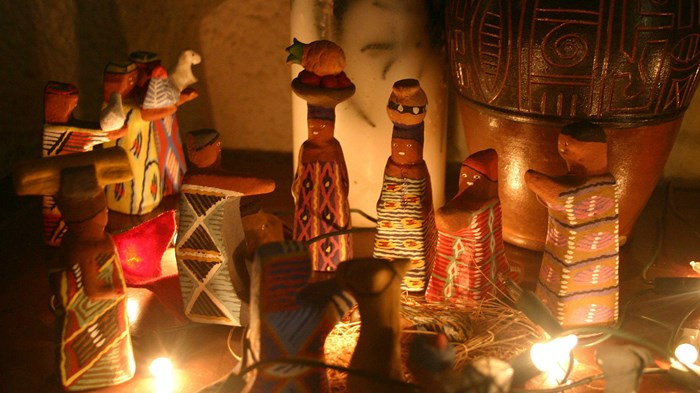
The lyrics to a popular yet much maligned Africa advocacy song are now a bit more defensible, given that Ebola has led Sierra Leone to ban Christmas celebrations.
"Do they know it's Christmas time at all?" asks the chorus of Band Aid's 1984 fundraising success, rerecorded this year by Bono, One Direction, Chris Martin, and other artists to raise money to combat Ebola in West Africa. In hard-hit Sierra Leone, the government just banned public gatherings that celebrate Christmas and New Years amid anxiety about the spread of the deadly disease.
“Ebola is hitting us very hard because we are a very close-knit society,” said President Ernest Bai Koroma in a Sunday address. “We are in very close proximity to each other, we can reach each other's towns and villages in record time; our relatives are everywhere seeking jobs, businesses and other opportunities. That is why a tragedy anywhere in Sierra Leone is a tragedy everywhere in this country.”
Reuters reports that Sierra Leone intends to send out troops to enforce the measure. Religion News Service reports that the general secretary of Sierra Leone’s Council of Churches believes Christians should be allowed to attend church on both holidays.
Sierra Leone currently has the highest number of cases of Ebola. Since the outbreak began, it has suffered more than 8,000 cases and roughly 1,900 deaths, reports the BBC.
Victor Zizer, a Sierra Leone theologian supported by ScholarLeaders International, describes the "typical celebration" of Christmas in Sierra Leone:
Christmas is first and foremost, always a family time - a reunion of close relatives. Because Christmas falls at rice harvest, the day is celebrated with a special feast – usually, rice meals served with chicken stew, beef or goat soup. Most people do their cooking very early in the morning so they can send dishes for loved ones and neighbors, as a symbol of sharing and thanksgiving for God’s blessings. The early catering also helps them to be ready to receive guests who may visit. Families, especially children, dress in new clothes, footwear, and Christmas make-ups; all these constitute their special Christmas gift. For many in typical rural settings, this much anticipated day marks the New Year when they buy or are provided with new outfits. The next stage in the celebration picks up in the afternoon with various masquerades, traditional dance performances and sometimes parties. Children also go around during this time visiting relatives and close family friends receiving little presents.
Zizer then told the John Stott-related ministry how Ebola will make this year an "atypical commemoration":
Christmas in Sierra Leone will be very different this year. The ravaging effect of the Ebola outbreak has created a very unfriendly and unwelcoming environment. Whole areas have been quarantined to limit peoples’ movement. Friends and relatives outside of Sierra Leone who plan their annual visits around this period have all been scared off. As the Ebola disease continues to rear its deadly head in defiance to all efforts to mitigate it, claiming lives, with the rate of new infection soaring over 500 per week, we see a murky picture of Christmas in 2014.
The only consolation comes as Sierra Leoneans reflect on what Christ’s birth, and His coming into the world – (to Africa especially) means for us even in our kind of scenario. In the context of Mk. 1:30, we see Jesus visiting the home of one of His disciples, Simon Peter, where he was told of Peter’s sick mother in-law. Finding the woman, he healed her and she “began to wait on [serve] them.” His healing of her also became an occasion for many more healing and deliverance miracles to be performed in the lives of other sick and oppressed people; thus, His visit to Peter’s family became a blessing to many more.
Meanwhile, the latest iteration of “Do They Know It’s Christmas?” (first recorded to fight famine in Ethiopia) has come under fire from some African church leaders who see it as “patronizing and demeaning to Muslims” who live in the region but don’t celebrate Christmas, reports RNS. Of the 5.7 million people in Sierra Leone, 60 percent are Muslim and 10 percent are Christian, while the remaining 30 percent practice indigenous beliefs, according to the CIA World Factbook.
Others, such as Ebola survivor and nurse William Pooley, have called its “cultural ignorance a bit cringeworthy.”
“There exists a paternalistic way of thinking about Africa, likely exacerbated by the original (and the second, and the third) Band Aid singles, in which it must be ‘saved’, and usually from itself. We say ‘Africa’ in a way that we would never say ‘Europe’, or ‘Asia’,” wrote Bim Adewunmi for The Guardian, pointing out that Nigeria had successfully halted the spread of Ebola relying solely on local support.
Despite the criticism, the song sold 312,000 copies in its first week.
In a 2007 interview, Jars of Clay's Dan Haseltine explained how the Christmas song "looms over everybody's head." "That was such a terrible way of expressing what goes on in Africa in terms of objectifying it," he told CT. "That album took a broad brush and says this is what the Westerners think of people who certainly must not be as smart or aware of what goes on in the world."
CT reviewed a 2008 Compassionart effort by 11 leading Christian artists to make a tangible difference in poverty-stricken countries. A 2009 CT cover story examined "why Christian musicians are embarking on a different kind of world tour."
More recently, CT examined how ministry leaders in Sierra Leone, Liberia, and Guinea are responding to the Ebola pandemic. The three countries are home to approximately 8,600 churches and ministries.
“Churches don’t have a lack of desire or a lack of motivation. But the complications of getting involved are very difficult. There are a lot of hoops to jump through to figure out logistics,” Kim Kargbo, the founder of Women of Hope, a ministry working with disabled women in Sierra Leone, told CT. “It’s hard to know what to do in this complex situation. How to work around the risks and regulations that hamper the ability to work? The church in Sierra Leone is small. But what if it were mobilized to act? The goal would be to get each believer thinking about his or her biblical responsibility in this crisis.”
CT also noted how medical missionaries are helping Ebola-striken countries meet health care needs.
[Photo courtesy of robinelaine - Flickr]

Support Our Work
Subscribe to CT for less than $4.25/month


















